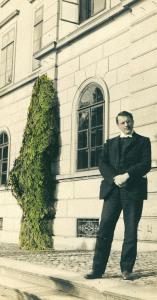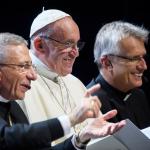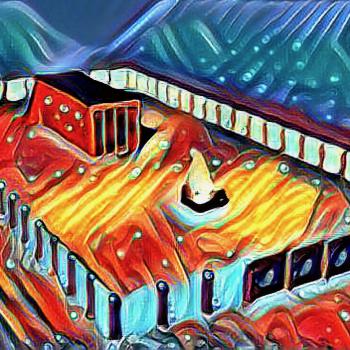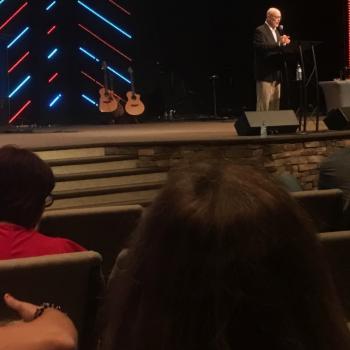We’re going to pick up with a theme from the last couple of videos, God’s revealed beauty. We’re going to look at a similar topic. These are Theological terms:
i. Mystery and Wonder
I’ve taught this in multiple settings. What I’m going to share will be notes from one sermon, over the next four weeks.
Some of the audio will overlap from week to week, just for continuity. I would like you to be able to read or listen to any one of the blog posts, and to understand it completely.
What I’m doing is something a little different with the videos. I have no real explanation or line of reasoning. It’s honestly my prayer that I can run with a simple theme of finding ways to give glory to God. I’m hoping that these posts will be an offering of sorts that will give God glory at the beginning of my tenure at Patheos.
VIDEO: Mystery and Wonder, pt. 1: Sensing our need for the supernatural
We’re entering a study that will focus on the Early Church (EC). Is the EC pretty close, if not exactly, what God created the church to be? It is Christ who institutes the church, who says to Peter, upon this rock I will build my church (Matthew 16.18).
It is Christ who starts the church. Because of that, the EC operates at a completely different level than we see on a normal basis now. Our norms are not their norms. They operate on a higher plane.
God often has much more for us than we are able to comprehend. The standard for our normal should be a little higher.
ii. Worship is a defining mark of the EC
Worship humbles us and glorifies Christ. It blesses us and frees us. Worship brings us into a stance of true humility. It helps us understand who we are in relation to God.
One of the mysteries of worship is that we draw close to God, but we realize that He is still Other.
We now turn to this concept with the ideas of mystery and wonder.
“Worship as an art form signifies the reality of otherness, the purpose and meaning of human history, and God’s saving involvement within history. It evokes mystery and brings us into wonder and awe.”[1]
When we truly worship, we enter a space of recognizing God for who He is. We also realize what He’s doing among us as a people.
One of the problems in the church today, across the nation, and in the western church (Europe and America), is not that we need a sense of mystery and wonder. That is apparent.
iii. The problem is that we no longer sense our need for mystery and wonder
We no longer see our need for the otherness of who God is, and the power of God operating among us. We think we have it figured out.
I enjoy studying theories and theorists. Psychology is the study of man, actually from psyche, Greek for soul. Theology is the study of God. The psyche is created in the image of God. If I’m going to study God, that’s a wonderful pursuit. But if I’m going to study something else secondarily, it is the psyche, the study of man’s soul.
Carl Jung was a famous psychologist in the last century. There are some things that he said that were great, and other things that weren’t. He did believe in something greater than the individual psyche. He believed in the symbolic and he believed in the spiritual.
Jung, Burgholzli Clinic, Switzerland, 1910 | Public Domain

Jung believed that what’s going on right now in our world is that there’s a modern mindset that we have. Because we’ve sold out to modern science and rationalism, we have disregarded the spiritual. He says this:
“Anthropologists have often described what happens to a primitive society when its spiritual values are exposed to the impact of modern civilization. Its people lose the meaning of their lives, their social organization disintegrates, and they themselves morally decay.”[2]
Modern civilization removes us from “spiritual values” and “meaning” in our lives. What he says next is profound.
iv. “We have stripped all things of their mystery and numinosity; nothing is holy any longer.”[3]
What a pronouncement upon our civilization, from someone who had an eagle-eye over many civilizations!
Jung uses the terms “mystery and numinosity” the way we use the terms mystery and wonder. The meaning of numinosity is fairly close.
The point is that we no longer live in a society that feels like we have a need for the supernatural. It’s a sad state of affairs in America and Western society today.
We don’t think we need mystery and wonder. We don’t think we need “spiritual values” and “meaning.” We don’t think we need “numinosity” . . . but do we?
[1] Robert E. Webber, The Younger Evangelicals: Facing the Challenges of the New World (Grand Rapids, MI: Baker, 2002), 199.
[2] Carl G. Jung, Man and His Symbols (Garden City, NY: Doubleday & Company, 1969), 94.
[3] Ibid.












